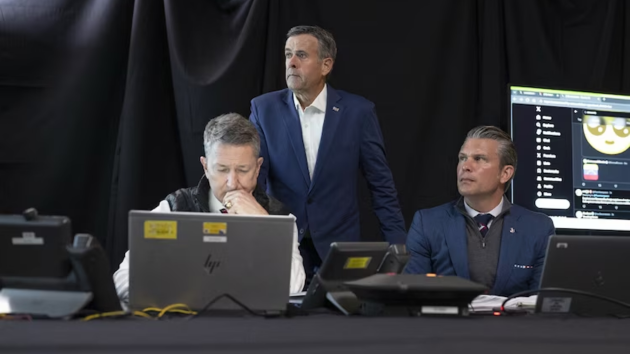Austin to Israeli defense minister: ‘Civilian casualties [are] far too high’ in Gaza
Written by ABC Audio ALL RIGHTS RESERVED on March 26, 2024
![Austin to Israeli defense minister: ‘Civilian casualties [are] far too high’ in Gaza Austin to Israeli defense minister: ‘Civilian casualties [are] far too high’ in Gaza](https://s3.amazonaws.com/syndication.abcaudio.com/files/2024-03-26/GettyImages_LloydAustin_032624.jpg)
(WASHINGTON) — Defense Secretary Lloyd Austin met with Israeli Defense Minister Yoav Gallant on Tuesday — a day after Israeli Prime Minister Benjamin Netanyahu canceled the delegation to the United States that was going to discuss plans for an operation in Rafah.
Israel pulled its delegation after the U.S. allowed, through abstention, for the U.N. Security Council to adopt a resolution demanding an immediate humanitarian cease-fire in Gaza for the remaining days of the Muslim holy month of Ramadan — and potentially longer.
The resolution called for the unconditional release of hostages being held by Hamas terrorists, though it did not explicitly tie that with a temporary cease-fire. The resolution further urged that the humanitarian pause should then lead “to a lasting sustainable ceasefire.”
In brief remarks ahead of their meeting at the Pentagon on Tuesday, Austin said in his strongest terms yet that humanitarian considerations, such as the 1.5 million Palestinian civilians currently sheltering in Rafah and the acute threat of famine, must be confronted amid the war in Gaza.
“In Gaza today, the number of civilian casualties is far too high and the amount of humanitarian aid is far too low. Gaza is suffering a humanitarian catastrophe and the situation is getting even worse,” Austin said ahead of a meeting with Gallant, who was at the Pentagon after meetings at the White House and State Department on Monday.
Austin raised humanitarian priorities as Israel plans an offensive in Rafah, a city in the south of Gaza bordering Egypt, a campaign Netanyahu has said is needed to root out Hamas. The White House has said Biden has “deep concerns” Israel will not do enough to prevent civilian casualties as it goes after Hamas fighters in the city.
The Israeli military said that it plans to direct many of the displaced Palestinians living in Rafah toward “humanitarian islands” in the center of the territory ahead of any invasion.
Hamas, a U.S.-designated terrorist group, waged an attack on Israel on Oct. 7, which has led to months of conflict.
In the Gaza Strip, more than 31,000 people have been killed by Israeli forces since Oct. 7, according to Gaza’s Hamas-controlled Ministry of Health. In Israel, at least 1,200 people have been killed by Hamas and other Palestinian militants since Oct. 7, according to Israeli officials.
“We continue to share the goal of seeing Hamas defeated, so we’ll discuss alternative approaches to target Hamas elements,” Austin said, adding that there would be a discussion about “how we can dramatically and urgently ease the humanitarian crisis in Gaza.”
Gallant did not mention humanitarian conditions or “alternative” military approaches in Gaza or Rafah, but previewed a discussion on continued U.S.-Israeli security cooperation.
“Today, we will discuss the developments in Gaza and the means to achieve our goals: the destruction of Hamas organization and bringing back the Israeli hostages back home,” Gallant said.
Austin reiterated that the United States is an ally to Israel, saying that “we continue to share the goal of seeing Hamas defeated.”
“Our security bond is unshakeable. The United States is Israel’s closest friend, and that won’t change,” Austin said.
Yet Austin’s characterization of the situation on the ground as a “catastrophe” is a more direct assessment than the Pentagon has previously offered — as the Biden administration continues to warn of dire humanitarian consequences in the Gaza Strip.
After the U.S. changed course by foregoing a veto at the Security Council, the State Department said during Secretary Antony Blinken’s meeting with Gallant on Monday, Blinken “reiterated opposition to a major ground operation in Rafah.”
While Austin did not express public opposition to a military campaign in Rafah, in addition to his call for security “alternatives,” he appealed for stepped-up humanitarian measures — beyond aid corridors by the sea that the Pentagon is spearheading.
“We need immediate increases and assistance to avert famine, and our work to open a temporary humanitarian corridor by sea will help, but the key is still expanding aid deliveries by land,” he said.
A report out earlier this month found that famine is “imminent” in northern Gaza amid ongoing high levels of food insecurity on the Gaza Strip as the Israel-Hamas war rages on.
President Joe Biden recently announced an “emergency” military mission to construct a port in the Mediterranean Sea on Gaza’s coast to get humanitarian aid in.
A senior defense official said the port’s main feature will be a temporary pier that will “provide the capacity for hundreds of additional truckloads of assistance each day.”
Copyright © 2024, ABC Audio. All rights reserved.
 KVSP
KVSP 




